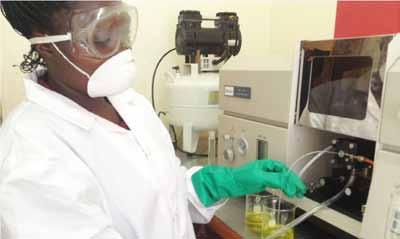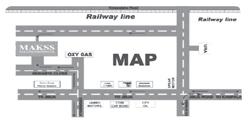
10 minute read
Kenya: Government to clean up polluted River Athi
KENYA:
Advertisement
The government is seeking Sh2.5 billion to clean up River Athi, which is threatened by pollution. Water Principal Secretary Fred Segor says the ministry is in the process of setting up a team of experts to develop a plan to guide the process.
River Athi, whose source is Ngong Hills, traverses several counties in Ukambani and the Coast region. Residents downstream have raised the alarm over the pollution, which threatens the river’s entire ecosystem.
The proposed Thwake Dam, which will be constructed at the confluence of the Athi and Thwake rivers, is also likely to be threatened if the pollution of River Athi remains unchecked.
Last year, the House Committee on Water and Natural Resources toured sections of the river in Yatta and Mwala constituencies, on the invitation of Yatta MP Francis Mwangangi, to assess the extend of the pollution.
The MPs resolved to ensure that the river is protected from further pollution. Prof Segor spoke recently after opening an induction retreat for national water sector institutions’ boards of directors on the Water Act (2016) at a Machakos hotel.
He said the government has committed to clean up the river because of its strategic relevance to the country’s water needs.
“River Athi is one of our very important rivers in Kenya and that’s why we are sourcing for funds to the tune of Sh2.5 billion to see what we can do to clean up the river,” said the PS.
He added that the clean-up, which would be implemented by the Government, donors, and development partners, would take about 10 years. Segor said the government had set aside money in the 2016/17 budget for the clean-up. “More allocations will be made in subsequent budgets.”
The PS said legal action would be taken against industries and other institutions polluting the river.
“We are calling upon industries and all concerned institutions to strictly adhere to regulations and guidelines of waste disposal. If they fail to do this, the bodies mandated to regulate use of water and to safeguard the environment, including the Water Resources Authority and the National Environmental Management Authority will initiate their prosecution,” he said.
Segor, who also read a speech for the Cabinet Secretary for Water and Irrigation, Eugene Wamalwa, noted that the sector faces challenges that need urgent attention by policy makers, regulators, and project implementers. According to the CS, a new water law will spearhead the development of the sector.
“The Water Act, 2016 requires restructuring and/or creation of new institutions,” he said.




UGANDA ENVIROMENT:
Kabale, Ntungamo, Mbarara Wetlands Destroyed by Encroacers
By Enock Were
Climate Action Network Uganda (CAN U), a nongovernmental organisation engaged in environment conservation advocacy on Monday petitioned government to address issues of climate change.
In the petition presented by Mr Isaac Kabongo, the chairperson of the organisation, during the World Environment Day National celebrations in Ibanda District, rapid population growth (of 3.2 per cent per annum) was cited as a major cause of the widespread encroachment on environmental resources.
The petition states that political interference, government failure to enforce environmental protection compliance by investors, and inadequate funding to the environment subsector have also contributed to environment degradation.
“Uganda Wetlands mapping exercise in 2008 indicated that wetlands had reduced from 15 per cent in 1994 to less than 10.8 per cent of Uganda’s area due to pressure from industrial development, settlements, agriculture, clay and sand mining. Currently they are less than 8 per cent of the total area,” the petition reads in part.

Speaking at the celebrations, President Museveni said government would review environment protection law.
He, however advised citizens to stop wetland degradation and cutting down of forests.
The President reiterated that Kabale, Bushenyi and Ntungamo are the districts with heavily degraded wetlands. He noted that wetlands, forests and open water bodies in contribute 40 per cent of the rain the country receives while 60 per cent of it comes from oceans.
“By invading wetlands we are cutting off 40 per cent of the rain, therefore we are inviting death to ourselves,” said Mr Museveni.
According to the district environment officer, Mr Joseph Murangira, 71 of the 75 gazzeted wetlands in Kabale have been destroyed.
To combat this, Mr Murangira called for both central government and the local leadership intervention to promote wetland restoration. “If not restored, our district will face challenges of desertification and water shortages,” he said.
Residents in the various areas with wetlands have turned them into gardens, dairy and fish farms. Others carry out sand mining and brick making.
The Kabale District speaker, Ms Loy Zikampereza, says central government will have to compensate the community in case of eviction since they entirely depend on the wetlands.
“For more than 35 years, residents in Rubaya Sub-county have been using Kahungye wetland to grow Irish potatos. Waking up with a proposal to evict them without providing an alternative will be very unfair,” Ms Zikampereza said.
The Ntungamo natural resources officer, Ms Dinah Tumwebaze Joga, said: “ In Itojo Sub-county, Nyamukana and Nyaruteme wetlands have not been spared,” adding that they are currently addressing more than 100 cases environmental degradation.
President Museveni recently ordered for immediate vacation of wetlands in Ntungamo especially Kyamate and Keitanturegye wetlands in the municipality.
The Ntungamo town clerk, Mr Christopher Ahimbisibwe, revealed that the encroachers had planted eucalyptus trees.
“We have notified the encroachers including the Ntungamo Woman MP Beatrice Rwakimari to restore the wetland by cutting down trees they had planted,” Mr Ahimbisibwe said.
However, the Resident District Commissioner, Ms Justine Mbabazi, noted that restoring of wetlands will not be an easy task as the rich are the biggest encroachers. It is alleged that Mr Steven Rwangyezi, the director Ndere centre, has dug several fish ponds in Nyaruteme Wetland Itojo Sub-county.
The Bushenyi District environment officer, Mr Vincent Kataate, attributed wetland destruction to weak government policies and poor funding of the environment staff.
Speaking to Daily Monitor, the National Environment Management Authority focal person for South-Western region, Mr Jeconious Musingwire, said: “About 50 per cent of wetland resources are being squeezed because of agricultural activities, industrial development and urbanisation.”
The degraded wetlands in Mbarara are Rucece in Nyakayojo Division, Rubindi, Rushanje, Kibingo, Kashasha, Bujaga, and Kibuba-Kongoro -Nyakaikara. However, restoration of wetlands has been done in the lower part of Rucece, 118 acres of Nyakambu wetland shared by Mbarara and Sheema districts formerly degraded have been restored while in KashashaKibingo -Rushanje wetland recovery is at 60 per cent.
This project is in line with the Bank’s High 5 priority areas, particularly ‘Feed Africa’, which seeks to unlock the potential of agriculture in improving the lives of African people.
The Bank received strong endorsement from the Rwanda Governance Board, Rwanda Agriculture Board and Rulindo District Assembly, recommending SERUKA as a suitable implementing agency for this project. To ensure coherence with Government plans, the project will also have a Steering Committee comprising all key Ministries, Departments and Agencies as well as representatives from the private sector.
“The project is going to boost our incomes as beekeepers in the region as we will have increased production of honey,” said Rwabuhungu Venant, President of the Murambi Honey Collections Centre. “It will also equip us to bypass intermediaries and interact directly with the external market in addition to enabling us to produce multiple other honey-based products such as candles and wax.”
Niwemfura Odette, President of one of the beekeepers cooperatives in Murambi and a widow with four children, stressed how the project would increase the capacity of her members to acquire additional beehives. “We have high expectations,” she said.
Hashi described the honey value chain project as a testament to the Bank’s excellent partnership with the Government of Rwanda. It is also hoped that this pilot project will provide useful lessons to all stakeholders to support women’s empowerment through trade.
“Agriculture is one of the sectors identified by the Rwandan Government to drive growth.
AGR JOINS THE PEOPLE OF UGANDA AND THE REST OF WORLD COMMUNITY TO COMMEMORATE 2017 WORLD ENVIRONMENT DAY!


By Staff Writer


AGR Geochemical Laboratory is a Ugandan Company providing geochemical analytical and field services to mining industry.
AGR Geochemical Laboratory has alliances with various commercial geochemical laboratories worldwide that are certified in over 1000 parameters of geochemical analysis. This broad scope allows us to test for gold, platinum group metals and base metals in stream sediments, soil, rock chips, and drill hole cuttings.
AGR Geochemical Laboratory provides a range of services for geochemical analysis including:
Sample preparation; Aqua Regia Digestion for Gold and Multi-Elements; Four Acid Digestion for Multi-Elements; Partial Digestion Geochemistry; Screen Fire Assay for Gold; Ultratrace and Trace Element analysis by AAS and ICP-OES; X-ray Fluorescence.
QUALITY & COMPLLIANCE

Geochemical Laboratory is committed to delivering quality results and outstanding level of personalized service to our clients. AGR Geochemical Laboratory is committed to providing expected turnaround of quality results and dedicated to customer service in maintaining the security of samples and the results in our care.
103-106 Sebugwawo Road, Entebbe P.O Box 37574, Kampala, Uganda Phone: +256 392 174 806, Fax: +256 392 174 806, Email: admin@agr-afr.com www.agr-afr.com
Geochemical Laboratory complies with high standards of professional conduct, ethical behavior and integrity of our services and is committed to maintaining the total confidence of its customers. AGR’s also ensures strict compliance with local, national and international laws, the accuracy, validity of reports and certificates that it provides to customers.

Minister Kitutu flags off Little Hands Go Green and NEMA World Environmental Day caravan
The state Minister for Environment Hon Kitutu Kimono, the Executive Director National Environmental Management Authority (Nema) Dr Tom Okurut, the Woman MP for Ibanda Hon Jovin Kaliisa and the CEO Little Hands Go Green Joseph Masembe flagged off the World Environment Day Celebration Caravan at the NEMA OFFICES in Kampala.
The team that set off planted trees along the route to Ibanda as part of the drive to bring to life this year’s World Environment Day theme of “CONNECT WITH NATURE” The team planted trees in Mpigi, and Buwama as well as Nkozi. Mpigi UMEA primary school, St Kizito Mpigi primary school are some of the schools that joined this noble cause. ‘Connecting People to Nature’, the theme for World Environment Day 2017, implores people to get outdoors and into nature, to appreciate its beauty and its importance, and to take forward the call to protect the Earth that we share.

World Environment Day is the biggest annual event for positive environmental action and takes place every 5 June. A number of activities were held to mark the World Environment Day 2017 where President Yoweri Museveni was the chief guest, tree planting activities in Mbarara, Masaka and Ibanda and an Environmental Run in Ibanda on Sunday among others Little Hands go Green Director Joseph Masembe said “This year’s theme invites all of us to think about how we are part of nature and how warmly we depend on it. It challenges us to find fun and exciting ways to experience and appreciate this vital relationship.

AN ISO 9001:2008 CERTIFIED COMPANY

We supply international quality corrugated boxes to the following Sectors: FMCG, Beverages, Flower, Dairy, Tea & Coffee, Fisheries, Fruits & Vegetables, Cosmetics, Tobacco, Pharmaceutical, Chick, Pizza etc.

Factory: Block 189, Kyagwe, Lwanyonyi Village, P. O. Box 817, Mukono District, Mukono Uganda, Tel: +256 414 291512, Mob: +256 752 333172. TOWN OFFICE: Plot 2, City Apartments, opp- Sure House, Bombo Road. Tel: +256 0312 266 231, WEBSITE: www.riley.co.ug







